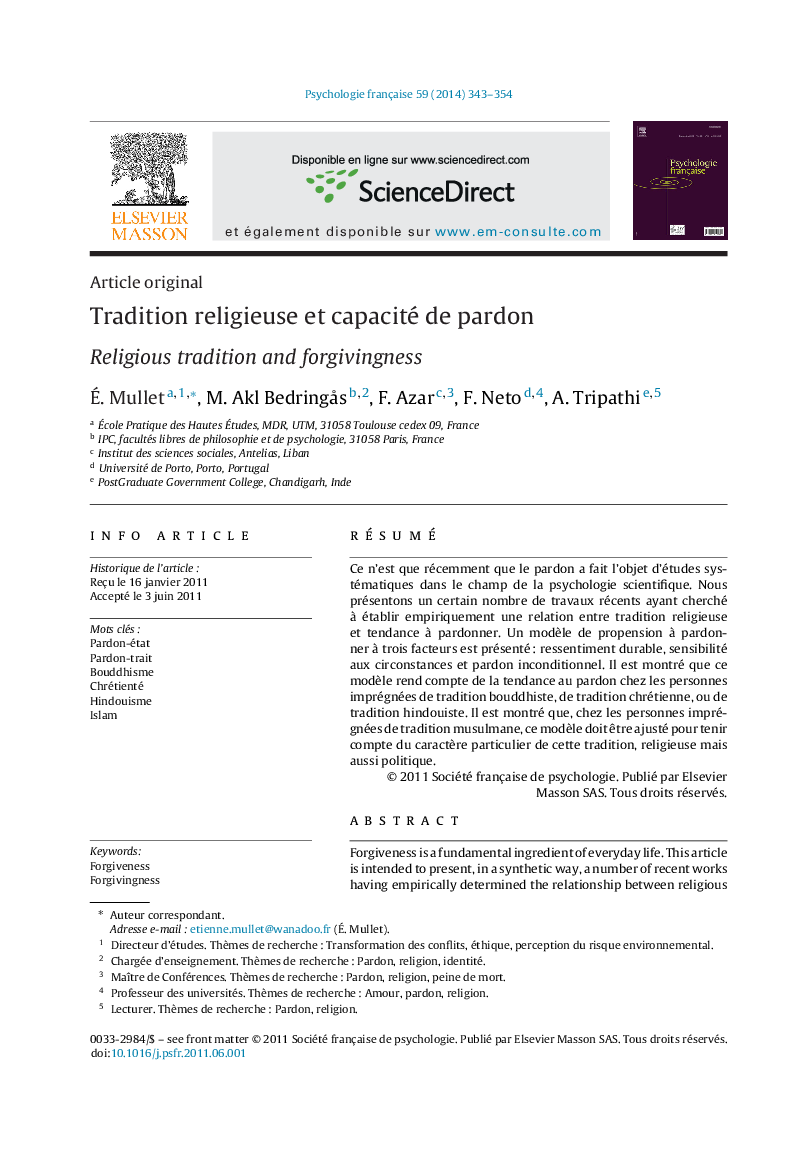| Article ID | Journal | Published Year | Pages | File Type |
|---|---|---|---|---|
| 336987 | Psychologie Franaise | 2014 | 12 Pages |
RésuméCe n’est que récemment que le pardon a fait l’objet d’études systématiques dans le champ de la psychologie scientifique. Nous présentons un certain nombre de travaux récents ayant cherché à établir empiriquement une relation entre tradition religieuse et tendance à pardonner. Un modèle de propension à pardonner à trois facteurs est présenté : ressentiment durable, sensibilité aux circonstances et pardon inconditionnel. Il est montré que ce modèle rend compte de la tendance au pardon chez les personnes imprégnées de tradition bouddhiste, de tradition chrétienne, ou de tradition hindouiste. Il est montré que, chez les personnes imprégnées de tradition musulmane, ce modèle doit être ajusté pour tenir compte du caractère particulier de cette tradition, religieuse mais aussi politique.
Forgiveness is a fundamental ingredient of everyday life. This article is intended to present, in a synthetic way, a number of recent works having empirically determined the relationship between religious tradition and forgivingness. To forgive is basically to give something to someone. For/give is the equivalent of the latin per/donare. Forgiveness is the gift of one's right to resentment after having been the victim of an offense. Forgiveness has been empirically investigated in two ways. The first approach specifically considered forgiveness as a possible answer to a given situation. The second approach considered forgiveness as a philosophy of life, as a habit; that is, as a personality trait. The studies reported in this article illustrate this second approach. A three-factor model of forgivingness is presented: lasting resentment, sensitivity to the circumstances of the offence, and unconditional forgiveness. It is shown that this model nicely fit empirical data from samples of persons grown up either in the Buddhist tradition, or in the Christian tradition, or in the Hindu tradition. It is also shown that among people grown up in the Muslim tradition this model must be adjusted to reflect the unique character of this tradition: Islam is both a religious and a political tradition. In brief, people whose spiritual references are either Buddhist or Christian or Hindu must be aware that if a conflict, even a minor one, opposes them to Muslims, a particular attention will be attributed to their apologizing behavior and to their efforts to repair the wrong committed. Forgiveness will probably be granted only after the offender has satisfied a number of conditions. Symmetrically, people whose references are Muslim must be aware that, if a conflict opposes them to people grown up in the other traditions, all the circumstances of the situation will probably play a more or less similar role (intention, apology, social proximity) and that forgiveness may be unconditionally granted. Unconditional forgiveness exists, at least in theory, in these traditions: it is not regarded as a weakness or as an immoral disposition.
